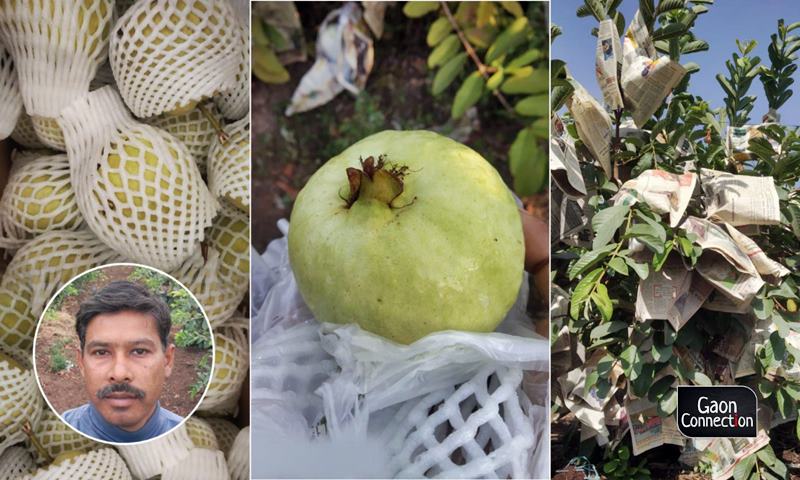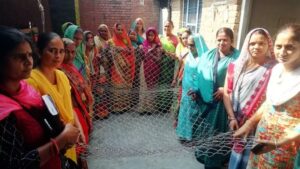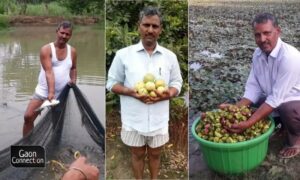Dhar, Madhya Pradesh
A decade ago, Dinesh Baggad, a farmer from Sajod village, was running into losses as the traditional vegetable crops he cultivated barely managed to earn him enough to cover his cost of production. Profits were nowhere in the picture.
The 43-year-old cultivator then approached the local Krishi Vigyan Kendra (farm science centre) in Dhar district of Madhya Pradesh and timely guidance from the agricultural scientists at the centre has helped him script his success story as a guava farmer.
Experts at the Krishi Vigyan Kendra advised him to raise plantations of a less popular and far more profitable variety of guava which originally grows in Thailand. Baggad brought guava saplings from a nursery in Raipur, the capital of the neighbouring state of Chhattisgarh.
“At present I earn Rs 25-30 lakh (Rs 2.5 to 3 millions) from each harvest. The guava plants bear fruits twice a year,” the happy farmer told Gaon Connection.
Also Read: Farmers in Himachal take up hing cultivation; India may no longer have to import it
The farmer also practices intercropping along with his mainstay guava orchard. He grows spices like ginger and coriander while he supplements his cultivation by planting onions and garlic in the rabi (winter) season.
Changing fortunes
Baggad owns two hectares of land and his guava orchard comprises 1.2 hectares. “Almost everybody is growing vegetables. There is too much competition in the prices. Thus, rising input costs and falling profits made me reconsider the type of crop I was cultivating ten years ago,” the farmer from Dhar said. “Fruits are not as popularly grown by the farmers as they are long term investments but yield great profits once the orchard is ready,” he added.
Talking about the initial investment needed in setting up the plantation, Baggad informed that it cost him almost Rs 300,000 per hectare.
Also Read: Green chilli farmers in the red
“My production in a year is almost 65 tonnes and the wholesale price of these fruits ranges from Rs 50 to Rs 100 per kilogram. So, I end up selling a single harvest of Rs 30 lakh to 40 lakh (Rs 3-4 million),” he informed.
According to him, the total investment in terms of packaging, transportation and some plantation expenses amount to Rs 15-20 per kilo. “If I deduct the input cost of about 20 per cent, even then I can secure annual profits worth Rs 25 lakh to Rs 30 lakh easily,” the guava farmer added.
“I am grateful to the scientists at the vigyan kendra as their counselling proved to be extremely helpful and using their expertise in horticulture techniques, I was able to plant the saplings of Thai amrood (guava) successfully and I am reaping profits happily today,” said Baggad.
GS Gathiye, senior scientist at the Dhar-based Krishi Vigyan Kendra, said that farmers in the district are regularly updated about innovations in the farm sector.
“We regularly advise farmers on issues like plantation management, nutrition management in the yield, weed management, and water conservation. Innovation and technical support are an important part of our counselling,” the scientist told Gaon Connection. “Many other farmers are deriving inspiration from Baggad and are keen to increase their incomes through such experiments,” Gathiye adde.
Thai guava variety
A full-grown Thai guava tree produces 40 kilograms of fruits in a single harvest and there are almost 2,000 trees in Baggad’s orchard. “The good thing about these fruits in comparison to vegetable crops is that the guavas don’t rot or get spoiled even after 20 days of plucking. They have a longer shelf life and risk of crops getting damaged is very low,” the farmer said.
“The VNR-1 variety of these guavas is large in size (about 300 grams to a kilogram), is shiny and has a higher nutritional value than the usual guavas. It takes 18 months for the plant to start bearing fruits but once planted, it produces fruits for the next 20-25 years,” he further informed.
The plucking season for the fruits commences in October and continues till February-March. It is noteworthy that Baggad uses minimal chemical fertilisers in his plantations and mainly depends on organic options like cow dung manure and vermicompost.
Also Read: When life gives you mangoes… savour them
The Thai guava variety is highly rich in vitamin-C, fiber, and folic acid and is considered to be beneficial for diabetes patients.
Baggad also stated that there is an exceptional demand for this variety of guava and he also exports it to the United Kingdom along with supplying it to cities like New Delhi, Kochi, Bengaluru, Indore and Kolkata.
For his accomplishment, the cultivator has also been awarded by the local Krishi Vigyan Kendra which earlier advised him to set up the plantation.
Fruit production on the rise in India
According to data from the Union agriculture ministry, guava cultivation in 2018-19 was recorded on an acreage of 276,000 hectares of land across the country and a total of 42,57,000 metric tonnes of guavas were produced in India in the given financial year.
According to the estimates for 2020-21, the guava acreage has increased to 304,000 hectares which is expected to yield 44,33,000 metric tonnes.
Also Read: Healthy Returns: Vegetable and fruit cultivation picks up momentum in India



















